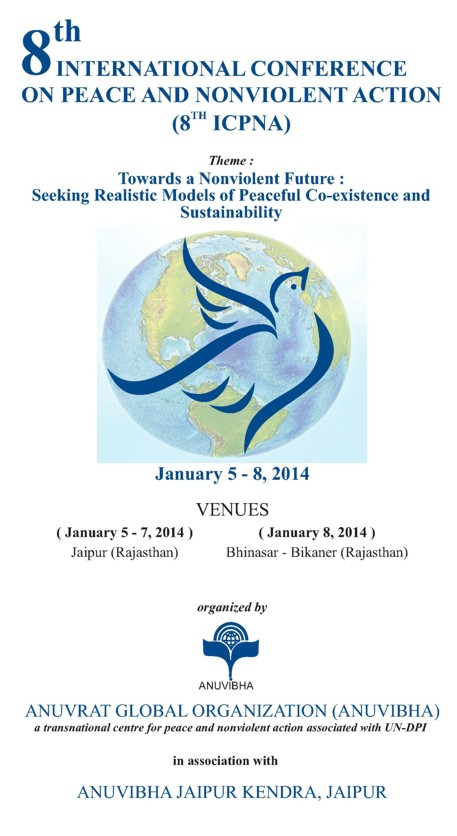 | 8th International Conference on Peace and Nonviolent Action |
Ahimsa (Nonviolence) is the quintessence principle of Jain Philosophy. Ahimsa is a Sanskrit word that means consideration of all souls as equal to our soul, compassion towards all forms of life without any discrimination of any categories. The concept is very pervasive which gives the message of harmony and co-existence among all living beings for sustainable and peaceful living. All the Tirthankaras (omniscients) not only preached the significant principle of Ahimsa but they practiced Ahimsa in its full essence throughout their life. The 24th Tirthankar, Bhagwan Mahavir could perceive the micro level of the concept of Ahimsa and deliberately remarked that there is interrelation between violence and possession (Parigraha). The more possessions, the more violence. Possession can be defined as attachment and it can be of many kinds like attachment towards power, position, ideas, wealth, land, beliefs, religion etc. Unequal distribution of natural resources, unjustified, inhumane and discriminative laws and ways of life create disparity between rich and poor and become the cause of eruption of violence in all sectors of life. It is obvious that nonviolence can only exist in the society if we respect and honor each other’s culture, custom, belief and tradition without interfering in their way of life, leaving behind the attitude of monopoly and dominance. That will create a gateway for such growth and development which can be sustained perpetually.
Sustainable development means to meet the needs of the present without compromising the ability of future generations to meet their own needs. In the name of globalization, the way the natural resources are misused, exploited, and consumed, it is difficult to say where we are heading. By making our life based on a complete comfort zone, are we moving towards insanity and chaotic ways of life? Are we misguided by so-called policies of development and growth showcasing the fantasy and leading towards cataclysm? The statistics and reports are very alarming and giving us a message to take a paradigm shift in the overall policies of future advancement and research. Nature has enough to feed and accommodate everyone but it is the greed of human that creates imbalance, injustice and inequality among the people. Are we thinking deliberately on this critical concern? Many international conferences, seminars and intellectual meetings are organized every year and hundreds of thousands of people discuss together but what kind of result do we achieve at the cost of millions of dollars? Unless and until every single individual makes a commitment for a big change in their life style based on the principles of nonviolence, it seems difficult to achieve peace. In this perspective, I want to call attention to the message given by His Holiness Acharya Sri Tulsi in 1948 at the launching “Anuvrat Movement” meant for individual transformation that brings social transformation by adoption of small vows of self-restraint in everyday life. The code of conduct of this movement encompasses the entire spheres of human development including individual, familial, social, economical, ethical, environmental and spiritual. For example: I will not kill any innocent creature, I will practice religious toleration, I will observe rectitude in business and personal behavior, I will not promote any social evil conduct, I will take care of environment etc. These small vows prepare human mind to have faith on the power of nonviolence and adhere to its practice with uncompromising determination in any situation. If we take care of the nature, nature will take care of us.
The concept of sustainable development walks on the same path asking to create growth on the basis of environmental sustainability, economic sustainability and social sustainability. It is apparent that sustainable development can only be achieved through the implication of the principles of nonviolence and limited possession by the every citizen of this Mother Earth. The world we live in is connected by space and time showcasing that pesticides sprayed in Chile have the potential to harm fish stocks off the coast of Japan. The air pollution we emit in India affects the quality of air in Europe and vice versa. On the flip side, the impact of clean air of one continent can positively affect the air quality across the world. The decisions taken by our ancestors and the policy makers in past made caused us to benefit or suffer from their choices. Similarly, looking into the future, the economic choices and policies we endorse today will fabricate the fate of our upcoming generation.
A new vision is emerging known as ‘Zero Waste Management’ that encourages redesigning the way the resources are consumed so that resources are reused in nature, no trash is sent to landfills and incinerators. The goal is to guide and educate the people in changing their life styles and practices to pursue sustainable natural cycles where all discarded materials are designed to become resources for others to use. That means designing and managing all the products and processes systematically to avoid and eliminate the volume and toxicity of waste and materials, conserve and recover all resources, and not burn or bury them. Implementing Zero Waste will reduce all discharges to land, water or air that are a threat to planetary, human, animal or plant health. The current state of worldwide urban development is depressing. There have been dire warnings about the implications of global climate change and a strain on the full range of resources from fuel to food, and we are not moving towards environmentally sustainable design that could reduce consumption quickly enough. But there are neither regulations nor is there the political will to make the changes to meet the growing challenges for urban communities for the next 20 years and beyond.
How much longer can we sustain the high consumption lifestyle we are used to? Who’s consuming? And what happens with the waste? To get the full picture on consumerism, we need to understand interconnected global systems of production and consumption. Globally, consumption patterns are unequal and wasteful. The US have just 5% of the world’s population, but it consumes 30% of the world’s resources and creates 30% of the world’s waste. It is not alone in wastefulness. A small slice of the world’s population consumes most of the resources and produces most of the greenhouse gas emissions. In this context, plastic waste and toxic e-waste are another critical concern of so called modern world. Why are electronic gadgets breaking so fast and why are they cheaper to replace than repair?
The zero waste ethos is a big call, radical in its ramification, and it requires more than a top-down, government-imposed approach. To be successful, zero waste needs to be embraced and implemented by citizens and community groups, business and industry, one and all. It is already technologically possible to build a zero-waste and zero-carbon-emission city. The question is - are we willing to do so and transform from consumers to citizens? It is feasible to represent an economical alternative to waste systems, where new resources are continually required to replenish wasted raw materials. It can also represent an environmental alternative to waste since waste represents a significant amount of pollution in the world. We need to encourage householders and businesses towards a cultural change such that the principles of the waste hierarchy and using resources more efficiently are embedded in all aspects of life and work. Effective behavioral change, waste minimization, resource exchange and recycling awareness campaigns should be put in place to minimize both municipal and commercial/industrial waste. These could include a target for a reduction in total waste arising on a per-capita basis for households. The Czech and Slovak Republics produced 300 kilogram per person per year in 2006; in UK the figure was 588 kilogram. Zero waste exemplar eco-towns should have the target on minimizing household waste that is not re-used, recycled or composted and should aim for 150 kilogram per person per year. Residual waste arising of 159 kilogram per person per year (from a total per capita generation of 560 kilogram) has been achieved in Flanders, Belgium.
If few can become exemplar of using and reusing the resources with zero waste, why not others can adopt this? It only requires the willingness and deep conviction of policy makers and people of that country. Every change is possible if it has taken the right direction of development and growth. The substantial problem of over consumption and wasteful production can resolve if the citizens of mother Earth practice self discipline, self control and delete unwanted and unnecessary products. To accumulate resources means the deprivation of resources of others and steal the rights of their share. Mahatma Gandhi has rightly said that our planet has enough to satisfy the need of people but not enough to satisfy the greed. We should understand the difference between our need and greed. Need can be fulfilled but greed makes oneself discontented in abundance. Let we commit ourselves that I can sustain my life with limited needs, limited possession and limited consumption that will result into nonviolent co-existence of all forms of life with happiness and peace.
 Samani Charitra Pragya
Samani Charitra Pragya